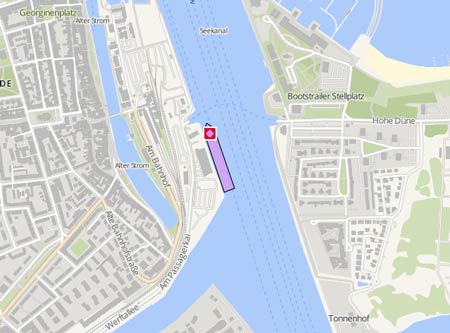STENA GERMANICA
Kurs/Position
Die letzten Häfen
Die letzten Wegpunkte
Die neuesten Nachrichten
Report: Electrical fault caused death of engineer
Several electrical faults in the engine room probably caused a crew member on the 'Stena Germanica' to die while on duty. That was the conclusion of a report on the incident from the National Accident Commission. On June 27, 2022, the ship engineer died on board the ferry, en route from Gothenburg to Kiel. The Swedish investigators believed that he likely died of electrocution and not natural causes as was initially assumed at the time of the death. The electrical installation work might have been faulty from when the vessel was new but went undiscovered because it did not impact the operation of the systems. The engineer was found unconscious next to a ballast pump in the engine room. He had been looking for a water leak. CPR was attempted without success, and the reports assumed that the death was due to cardiac arrest or similar circumstances, which were listed as natural causes. The investigation however identified that about two weeks later, on July 14, another engineer also looking for the cause of a water leak at the ballast pump received a strong electrical shock. Stena hired an electrical company that came aboard on July 15 to investigate the problems in the electrical system, and at the same time reported the incident to the police. They informed the authorities that the first incident which resulted in the death could have been an electrical accident. The investigators reported that the second engineer had leaned forward to feel where the water was coming from when he received a strong electrical shock from a wet solenoid value. At the time, the second engineer was not aware that it was the same position where the first engineer had been discovered. Several different errors caused the component to become energized. A gasket was missing and critically there was no protective grounding on the part. The incoming cables to the solenoid had also been changed which they determined meant that it was energized the entire time the pump was in operation. Because it was outside the ordinary isolated fault system, the problem was not detected. Further, because the value was operating no error messages were recorded. The Swedish Accident Investigation Authority concluded that when the second engineer touched the components looking for the water leak and when he came in contact with the water, he was shocked. They speculated that the first engineer encountered a similar situation leading to his death. The report recommended paying attention to the risks of improperly performed electrical work on board ships. It highlights that only people with the required knowledge of electricity and a ship’s special electrical system should be permitted to work on the systems. They also recommended that Stena review routines for training the crew on accident responses and shortening the time from the alarm till they reach the scene. They also recommend that Stena develop routines for consulting with shoreside medical services in the case of electrical shocks or electrocution aboard one of its ships.
Ferry powered with methanol recycled from residual steel gases
On June 22, 2021, the 'Stena Germanica' was powered with methanol recycled from residual steel gases. With this, Stena Line took the next step on their sustainable journey towards achieving zero carbon. The new fuel dubbed ‘Blue Methanol’, is recycled from residual sttel gases, a by product of the steel production industry and helps reduce the ferry’s reliance on diesel, thus lowering the vessel’s carbon emissions further. By making the 'Stena Germanica' blue the new fuels helps the vessel become greener. The ground-breaking project, which launched in 2015 when the dual-fuel system onboard he 'Stena Germanica' was converted to allow the vessel to run on both methanol and diesel fuel. It is the world’s first methanol powered RoPax ferry, which operates on the Gothenburg – Kiel route. Stena Line developed it with several partners, including Methanex, Wärtsilä and EU's Motorways of the Seas project. The conversion project was the first of its kind in the world and was so unique that it established methanol as a marine fuel for the first time ever. Methanol is much cleaner than traditional marine fuel. Sulphur and particulates are reduced by 90% and nitrogen by 60%. The steel industry and the maritime sector are two of the world’s biggest emitters of CO2, accounting for 6-8% and 2.5% of all CO2 emissions respectively. The FReSMe project, funded by H2020 EU program, aims to demonstrate the whole process that enables the CO2 captured from the steel industry to produce methanol fuel that will be used as fuel in the ship transportation sector.
Gas stove on truck exploded - truck driver injured
A man in his 50s suffered burn injuries at the head after an explosion aboard the "Stena Germanica" at Stena Line's terminal in Gothenburg in the morning of April 28, 2019. A gas stove had exploded inside a truck cabin at 9.30 a.m. on the car deck of the ferry when the cars were about to roll off the ship after arriving from Kiel. Emergency services responded to assist the truck driver. Three ambulances were on the scene when the alarm was raised. The man was taken to hospital with serious injuries but being stable. After the other vehicles were off the shiü, the truck was towed from the ferry for a technical examination. The police have initiated a preliminary investigation into a workplace accident. There was no suspicion of crime.
News schreiben

